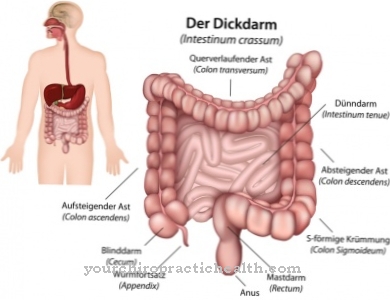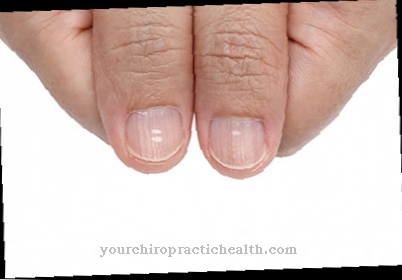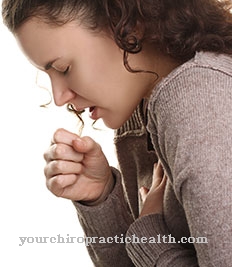A Taste disturbance or Taste disorder manifests itself in an impairment of the taste experience. Living a healthy lifestyle can sometimes help reduce the risk of the disease.
What is a taste disorder?

© stockshoppe - stock.adobe.com
In medicine, the taste disturbance is also called Dysgeusia designated. The term taste disturbance encompasses several forms of taste disturbance:
First, the taste disorder is divided into the so-called qualitative and quantitative taste disorder. From one qualitative taste disturbance Experts speak when it is not the quantitative expression of the taste perception that is disturbed, but the nature of the taste perception: For example, the qualitative taste disturbance includes the perception of taste impressions even though there is no corresponding taste stimulus (e.g. food). One speaks here of so-called phantogeusy. If, on the other hand, a taste is experienced that is inadequate for the underlying object, this is referred to as parageusia.
From one quantitative taste disturbance one speaks against it when the expression of the taste sensation is disturbed; hypergeusia describes an increased taste experience, hypogeusia a restricted experience. Ageusia is a complete loss of taste.
causes
The causes of a taste disturbance can be diverse. Usually a taste disorder only develops over time; in rare cases a taste disturbance can be congenital.
When it comes to the causes of a taste disorder, a distinction is made between the so-called neural, central and epithelial causes: A nerve-related taste disturbance is mostly based on damage to various cranial nerves that are involved in the sense of taste. This can happen, for example, during operations in the head area or as a result of fall injuries.
Central causes (affecting the central nervous system) of a taste disturbance can be caused by injuries to the brain or various neurological, degenerative diseases.
If there are epithelial causes (affecting the cover and glandular tissue) for a taste disturbance, for example inflammatory or viral processes, but also side effects of drugs can be present.
Another cause of taste disorders could be the novel coronavirus disease (COVID-19). Doctors from different countries point out this new symptom of a corona infection.
You can find your medication here
➔ Medicines against loss of appetiteSymptoms, ailments & signs
Taste disorders can appear in different forms and forms. The symptoms depend on how long the disorder has existed and the underlying causes. Basically, taste disturbances express themselves in that the person affected perceives tastes and sometimes smells as changed.
Some people experience a complete loss of taste, while others are more aware of stimuli. Some patients perceive a certain stimulus differently and can no longer clearly assign the taste of onions, for example. In individual cases a taste is perceived that is not there.
In addition, there are often noticeable sensory disturbances in the area of the mouth and tongue. Those affected then feel numbness or even a tingling sensation in the mouth. The symptoms of a taste disorder often come on suddenly and last for weeks, months, or even years. Usually they can be relieved quickly with drug treatment or they even resolve spontaneously on their own.
Accompanying symptoms usually do not occur with a taste disorder. However, those affected find the changed taste perception very unpleasant. If the symptoms are severe, there is a loss of appetite and, as a result, unwanted weight loss.
diagnosis
The diagnosis of a taste disorder is initially based on the descriptions of an affected patient. For example, a doctor usually first asks whether there is a restriction in taste and how pronounced it is. The doctor can also inquire whether the restricted taste sensation in the context of a taste disorder only relates to certain flavors or to the entire taste spectrum. In this way, among other things, the type of taste disorder present can be defined more precisely.
After the patient has obtained the information, additional diagnostic procedures are common; These include, among other things, taste tests and examining the mouth and throat. Depending on the cause of a taste disorder suspected by the doctor, methods can also be used that reveal brain waves that arise when a taste stimulus is presented (e.g. the EEG).
Complications
A taste disturbance can have different causes, which can lead to different complications. For example, the flu can cause the disorders. In the course of the disease, bacteria can infect the body in addition to the underlying disease and thus lead to otitis media. Sinusitis or bronchitis are also possible.
One of the most dreaded complications involves bacterial pneumonia. Furthermore, the heart is also heavily stressed by the flu, so that cardiac arrhythmias can occur. Diabetes mellitus can also be the cause of the taste disorders. A long-term increase in sugar can lead to a blockage of vessels, which then leads to damage to certain organs.
The kidneys are often affected, which can fail in the course of the disease (diabetic nephropathy). Disturbances in the electrolyte and water balance are the consequences. The vessels in the eye are also often affected. This can lead to poor eyesight, which can lead to blindness (diabetic retinopathy).
Nerves can also be damaged, the affected person then usually gets disturbances in sensitivity. This can result in the patient no longer feeling pain, especially in the foot. Wounds can no longer be felt, which can spread and lead to the death of the foot.
When should you go to the doctor?
A doctor should be consulted as soon as the person concerned registers changes in their taste perception. If he notices that his taste sensation differs significantly from that of his fellow human beings, a visit to the doctor is advisable. Consult a doctor if you experience numbness of the tongue or hypersensitivity to food. If toxic and hazardous substances can no longer be recognized due to the taste disturbance, it is necessary to consult a doctor.
In many cases, everyday life can be managed well even with a taste disorder. However, a medical examination is necessary to determine the extent and cause of the disorder. Only in this way can future misconduct be prevented and the impairments taken into account. If symptoms such as sudden vomiting, nausea or dizziness occur immediately after eating food, a doctor should be consulted. Consultation with a doctor is also required if stomach pain or digestive tract impairment occurs.
In the event of diarrhea or constipation, a medical check-up should take place so that no further impairments occur. If the person concerned suffers from headaches, cramps or a general malaise, a doctor's visit is necessary. In the event of a diffuse feeling of pain, pressure in the chest or a feeling of fullness, a doctor should be consulted to clarify the cause. If psychological problems arise due to the taste disturbance, a doctor is also required.
Doctors & therapists in your area
Treatment & Therapy
Effective treatment of a taste disorder first requires a detailed diagnosis. In this way, the cause behind a taste disorder can be treated in a targeted manner.
If there is a qualitative taste disorder (i.e. a taste disorder that expresses itself in the fact that a person concerned has a qualitatively altered taste sensation or perceives tastes without the presence of a real taste carrier), there is a high chance that the symptoms will disappear again after about 12 months.
Therapy successes are also recorded here, for example, after the therapeutic administration of zinc or so-called alpha-lipoic acid, which are supposed to help combat corresponding abnormal sensations. If the qualitative taste disturbance is caused, for example, by the intake of medication (this can be expressed, for example, by a bitter or metallic taste), discontinuation of the corresponding medication usually leads to a rapid recovery of the original taste sensation.
If a taste disturbance is caused by inflammatory processes in the oral cavity (due to poor oral hygiene or infections), treatment with antibiotics can be effective.
Outlook & forecast
The prognosis of the taste disturbance depends on the cause. If the taste buds in the tongue have been destroyed due to a burn, the symptoms will be alleviated within a few days or weeks. The organism can let dead taste buds emerge again, so that after a short time a symptom freedom can be expected.
If the nerve tract is damaged, it must be checked whether it is regenerative or irreparable. A permanent impairment of the nerve fibers leads to a lifelong impairment of taste perception. In the case of existing paralysis, for example, recovery is no longer possible.
If there is a tumor disease, the prospect of a cure for the taste disorder also decreases. The benign or malignant tumor must be completely removed before the symptoms can be alleviated. In some cases, the taste disturbance is then regenerated, as the taste buds are re-formed. In principle, the prognosis for cancer depends on the individual circumstances and the overall diagnosis of the patient. A cure is not always possible.
In the case of a traumatic disorder, an alleviation of taste perception is linked to the success of the therapy and the cooperation of the patient. Normally, there is an improvement in health as soon as the emotional stress is processed or cognitively reassessed.
You can find your medication here
➔ Medicines against loss of appetiteprevention
An effective prevention against a taste disturbance can take place above all by positively influencing the possible causes. For example, consistent oral hygiene can help avoid inflammation or impairment in the oral cavity. Dealing responsibly with underlying diseases that can lead to a taste disorder can help reduce the risk of developing a taste disorder.
Aftercare
Follow-up care for a taste disorder usually proves to be relatively difficult. The taste disorder cannot always be treated completely, so that in some cases the person concerned is dependent on lifelong treatment or has to live with this disorder for his entire life. However, the patient's life expectancy is not reduced or otherwise limited by this disorder.
In some cases, medication can be taken in the event of a taste disturbance, whereby the intake of zinc in particular can have a positive effect on the course of this disease. The person concerned should therefore pay attention to a regular intake of this drug, whereby of course also possible interactions with other drugs have to be considered.
In case of doubt, a doctor should always be consulted. Proper oral hygiene can also reduce or completely remove the taste disturbance. Those affected should therefore always brush their teeth and, if necessary, use a mouthwash. This is the only way to alleviate the symptoms.
If the taste disturbance is treated with the help of antibiotics, it should be noted that they should not be taken with alcohol. Furthermore, contact with other sufferers of this disease can also prove to be useful. It is not uncommon for information to be exchanged.
You can do that yourself
Depending on the cause of the disease, the person affected can pay some amounts to obtain relief or healing of the symptoms.
If the taste disturbance is triggered by an unhealthy lifestyle, a change in food and avoidance of toxins and harmful substances can already contribute to recovery after a few weeks or months. If there is a genetic disease or nerve damage, a cure for the taste disturbance is unlikely. In these cases, for the purpose of self-help, the person concerned should adapt his lifestyle in such a way that he avoids important sources of danger.
With the failure of the taste system, an important natural warning signal of the organism is no longer available. This must be taken into account when consuming food. Attention should be paid to the temperature, appearance and smell of the food before it is distorted. In this way, burns in the mouth or the ingestion of spoiled food can be avoided.
If there is any doubt about the quality of the food, the advice of a person of trust should be sought. Since the taste warns against the consumption of spicy foods, it is advisable to avoid products with a strong spicy content. This prevents discomfort and stomach and intestinal problems.












.jpg)



.jpg)










.jpg)
